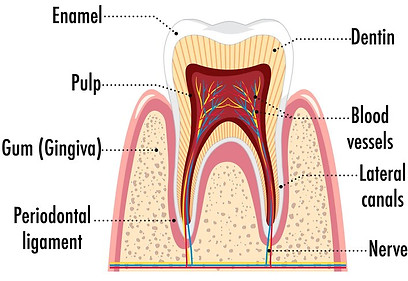What is a Root Canal?

A root canal is the space within the root of a tooth that contains the pulp, which includes nerves, blood vessels, and connective tissue. When this pulp becomes infected or damaged, it can cause severe pain and potentially lead to the loss of the tooth.
What is Root Canal Treatment?

Root canal treatment, also known as endodontic therapy, is a dental procedure aimed at removing the infected or damaged pulp from the tooth. This process involves several steps to ensure the tooth is thoroughly cleaned and sealed to prevent future infections.
Why is Root Canal Treatment Necessary?
Root canal treatment is necessary when the pulp inside the tooth becomes infected or damaged. Root canal treatment becomes necessary when the pulp, the innermost part of the tooth, becomes infected or damaged, which may lead to an abscess.
Symptoms like severe toothache, prolonged sensitivity, and swelling around the tooth can indicate the need for this procedure. This can occur due to various reasons such as:

Infected Pulp: Bacteria can infect the pulp, causing pain and swelling.
Abscess: An abscess can form at the tip of the root, leading to severe pain and potential infection spread.
Anatomy of the Tooth and the Root Canal System

Enamel: The hard outer surface.
Dentin: The layer beneath the enamel.
Pulp: The innermost tissue containing nerves and blood vessels.
Root Canals: The hollow spaces that house the pulp.
What are the Steps Involved in Root Canal Treatment ?
Getting crowns and bridges involves several steps to work towards the goals of the treatment plan:



Initial Consultation
Anesthesia and Preparation
Tooth Isolation
Our dentists will assess your tooth and discuss the next course of action
To ensure your comfort during the procedure, a local anesthetic will be administered to numb the affected tooth and surrounding area.
A rubber dam is placed around the tooth to keep it dry and free from saliva during the procedure. This ensures a clean working environment.



Accessing the Pulp Chamber
The dentist will drill a small opening in the crown of the tooth to access the pulp chamber and root canals.
Cleaning and Shaping
The dentist will carefully remove the infected or damaged pulp tissue from inside the tooth.
Final Restoration
Once cleaned and shaped, the canals are filled with a biocompatible material to seal them and prevent future infection.
Common Questions about Root Canal Treatment
Is root canal treatment painful?
Contrary to popular belief, root canal treatment is generally not painful due to the anaesthesia administered during the procedure. Most patients experience relief from their pre-existing pain afterward.
Contact Us!
If you suspect you may need a root canal treatment, you may schedule a consultation with our dentists. Our team is here to answer any questions you may have and guide you through the process.

